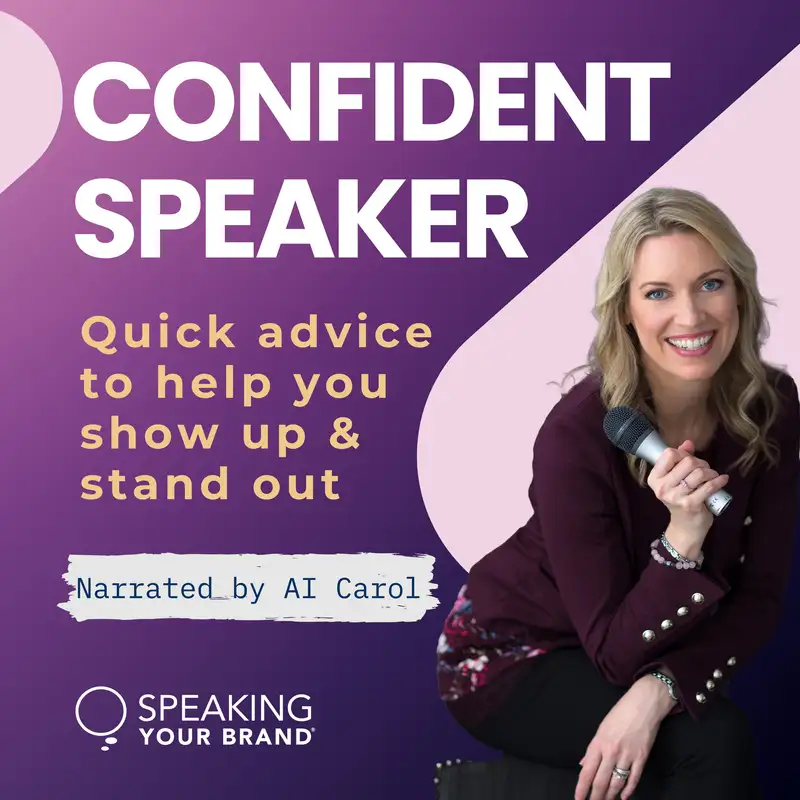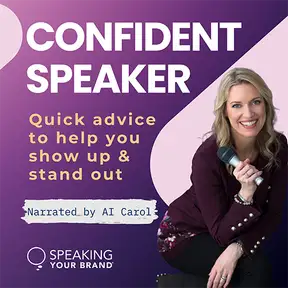How to Stop Saying "Um" and "Uh": Embrace the Pause and Ditch Perfectionism
Welcome to the Confident Speaker Podcast by Speaking Your Brand. This is your host, AI Carol. Have you ever listened back to a recording of yourself speaking and cringed at how many times you said, you know, or like? Filler words are one of the most common hangups for speakers, especially when we're nervous, thinking out loud, or trying to find the next thought. But here's the thing.
AI Carol:Using filler words doesn't make you a bad speaker. It makes you human. Still, when they're used too often, they can distract your audience and make you sound less confident than you actually are. Here are three things you can start doing right now to reduce how often you use filler words without sounding robotic or losing your train of thought. Tip number one, embrace the pause.
AI Carol:It's okay to pause. In fact, it's powerful. When you feel the urge to fill space with or just breathe and let silence do the work. A pause shows confidence. It gives your audience time to process and it gives you a second to think rather than scrambling for the next word.
AI Carol:You might feel awkward at first. It might feel like five seconds of silence when it's really only one. But remember, your audience hears it as thoughtfulness, not as panic. Try this. The next time you're in a meeting or giving a presentation, notice when you start to ramble or throw in an Instead, pause.
AI Carol:Smile if you can and let yourself find the next sentence calmly. Tip number two, practice, but practice out loud. So often we rehearse our presentations in our heads. And in our heads, everything sounds amazing. But when we speak out loud, we realize how many gaps there are.
AI Carol:Practicing out loud helps your brain get used to the rhythm and flow of speaking clearly. You learn where your transitions are weak and where you feel unsure, and that's often where the filler words creep in. Pro tip, record a voice memo of yourself going through your talk or explaining your idea. Play it back, yes, even if it makes you cringe, listen without judgment and notice when and why the filler words show up. Do they come in when you're unsure, when you shift topics?
AI Carol:That awareness is everything. Tip number three, slow down and focus on connection, not perfection. Many times we overuse filler words because we're in a rush. We're trying to get it all out quickly, afraid we'll forget something, or we're so internally focused that we forget we're talking to people, not performing for them. So here's my challenge to you.
AI Carol:When you speak, shift your focus from trying to sound perfect to simply making a connection. Would you rather listen to someone who speaks with perfectly rehearsed lines or someone who sounds like a real person speaking directly to you with intention? When you focus on connection, you naturally become more present. When you're present, you slow down. And when you slow down, those filler words begin to fade.
AI Carol:Let me leave you with this. You don't have to eliminate every or to be a great speaker. Some may still sneak in and that's okay. But with awareness, intention, and practice, you'll find your message gets clearer, your impact grows stronger, and you'll feel so much more confident every time you speak. You've got this.
AI Carol:If you'd like support on developing your speaking presence, storytelling, or signature talk, we'd love to work with you. You can find all the ways we help at speakingyourbrand.com, and be sure to follow the confident speaker podcast right here on Apple Podcasts or Spotify so you don't miss more strategies like these to help you be the speaker you were meant to be. This on demand episode was generated by my AI voice clone trained on speaking your brand content. Thanks for listening.

